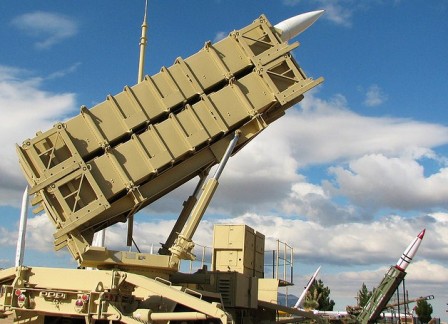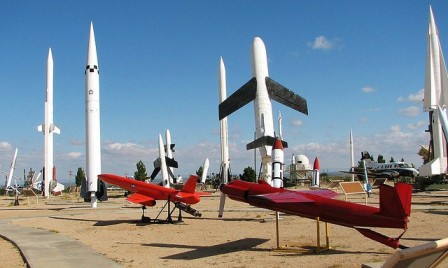NATO’s Pending Move on Syria: Geopolitics of Chaos
The drums of war are getting louder from the United States and their NATO allies/vassals. Soon missiles will be deployed in Turkey along the border with Syria, and in Washington talk is coming from the Obama administration and mainstream media about a “red line” that is not to be crossed by the Assad regime. The red line is about Assad’s potential use of chemical weapons, mainly Sarin gas, against his own population. This is an all too-familiar song and dance to justify a foreign intervention. During the prelude to the invasion of Iraq by the US in 2003, the Bush administration used a similar subterfuge to convince the public that the invasion of Iraq was a “war of necessity.” The evidence that Saddam Hussein possessed and planned to use Weapon of Mass Destruction (WMD) was cooked up by both Bush and the Blair administrations in the UK. In both cases, they had the complicity of the mainstream media, including US news source of reference, The New York Times.
War of choice passes for war of necessity
On Thursday December 6, 2012, some vague diplomatic efforts to end Syria’s civil war took place in Dublin, Ireland; the talks were between US Secretary of State Clinton and Russian Foreign Minister Lavrov. It is unlikely, however, that a diplomatic solution can end Syria’s 21-month civil war although Moscow seems to realize that Assad’s days in power are numbered. Despite this pseudo eleventh-hour diplomatic effort by Clinton and Lavrov in Dublin, the reality and tone in Washington were rather different. Defense Secretary Panetta stated that “intelligence reports raise fears that a desperate president Bashar Assad is considering using his chemical weapons arsenal. I think there is no question that we remain very concerned, very concerned, that as the opposition advances, in particular in Damascus, Assad regime might very well consider the use of chemical weapons.”
NATO’s arsenal on the move
Six Patriot missile systems are to be deployed in Turkey by the US, Germany and the Netherlands within four weeks. They are supposed to “reinforce the NATO member air defenses”. The surface-to-air missiles, which can intercept missiles, will be transported to Turkey by sea. Parliaments in both Germany and the Netherlands will vote on the deployment next week, but they are likely to approve it. Two missile batteries are supposed to come from each country. Once the six Patriot missile systems become operational, they will be able to launch more than 500 missiles. Around 100 soldiers are needed to operate each Patriot system which means that 600 troops from the US, Germany and the Netherlands will be deployed to Turkey within a month.
Syria: Replay of Libya or rehearsal for Iran?
The two world powers that can oppose NATO’s looming attack on Syria are Russia and China; but if they have not done anything concrete — beside some rhetorical opposition at the UN — to block NATO’s military attack and armed support of the so called Libyan “revolution,” why would they do anything to stop NATO from toppling Assad? It would seem that, compared to the fate of Gaddafi, the case of Assad should be different, especially for Russia, which after all has had historical ties with Syria and the Assad dynasty since 1962. For decades, Syrians used to attend Russian universities and more often than not return with Russian wives. At the start of the civil war almost two years ago, the number of ethnic Russians or people with dual nationalities living in Syria was an astounding 100,000. The prospect that Russia might lose Syria as its strongest ally in the region would be a crippling loss of influence for the government of Vladimir Putin, and just like post-Gaddafi Libya or post-Mubarak Egypt, a post-Assad Syria is likely to be controlled by Islamists like the Muslim Brotherhood and even the Salafis.
Dilemma for Russia and China
It is conceivable that there is some geopolitical grand bargain in the works between the United States, Saudi Arabia, Qatar, and Western Europe — which are all actively and officially supporting and arming the pseudo-Syrian revolution — and Russia and China. But what could this cryptic plan be if any? What would be the benefit for any of the players involved to allow the entire region, with the exception of Iraq, to become Sunni dominated and come under the sphere of influence of Saudi Arabia and the oil-rich Gulf countries? Are money and oil the only consideration, as opposed to political influence, and if so, are side deals with Russia and China already being made to split the loot?
End game or geopolitics of chaos?
People who run non-rational scenarios, and especially those who are obsessed by conspiracy theories such as ones concerning the so-called “Illuminati”, are ever talking about an “end game”: some mysterious twisted plan concocted by Henry Kissinger and his friends. The plan is, of course, ultimately about absolute world domination and enslavement of the entire human race. But this is giving too much credit to a group of mainly elderly men whose core issues are more likely to be incontinence and memory loss than the establishment of a new world order with themselves at the helm.
A more logical, rational, but actually scarier notion is that there is no master plan at all. If one thinks about this cynically, using the cold capitalist notions of bottom-line and quarterly profit, the business of wars — any wars, fought for any reasons — is always a win-win proposition. The death machine of the military-industrial complex wins during the destruction and killing phases, then once everything is reduced to ash and rubble other arms of the same capitalist machine benefit from the reconstruction plans, whether this takes place in post World War II Germany though a Marshall Plan or in Iraq under the supervision of private companies like Halliburton.
Editor’s Note: Photographs one and seven by Eamonn O’Brien-Strain. Photographs three, four and six by Peacock Almntouf.
Related Articles




















2 Responses to NATO’s Pending Move on Syria: Geopolitics of Chaos
You must be logged in to post a comment Login